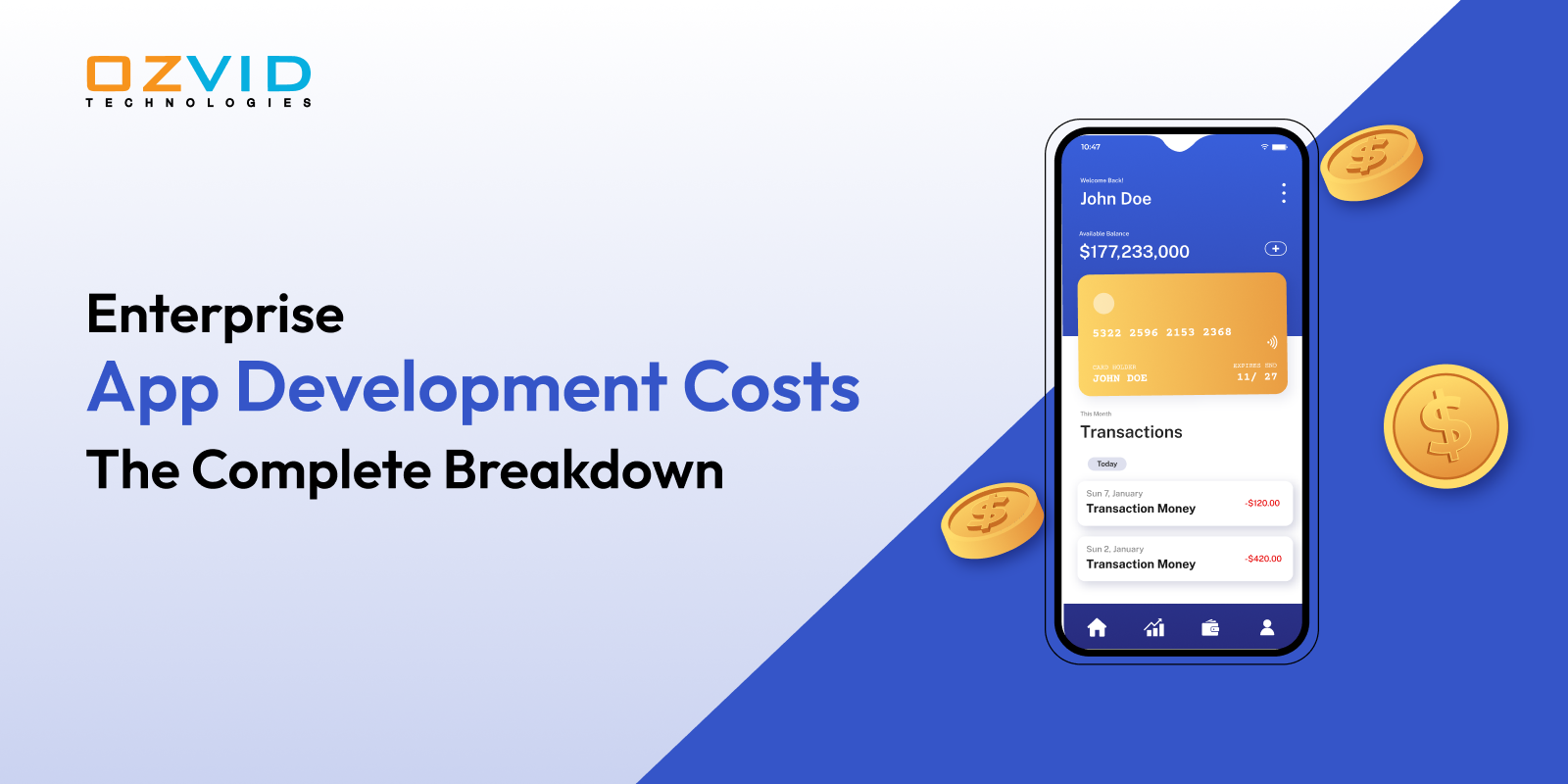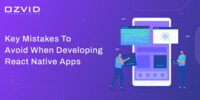- Sep 30, 2025
Share this post on:

Have you ever wondered how much it costs to build a custom enterprise app for your business? In today’s competitive business environment, companies of all sizes are increasingly turning to technology to solve their unique operational challenges, streamline workflows, and engage with customers. Mobile and web-based applications, or enterprise apps, have become essential tools for businesses, whether it's for internal operations, employee management, customer relations, or product management. However, one of the key considerations that businesses face when planning to build an enterprise app is the cost.
Enterprise app development is a complex process that requires careful planning, skilled resources, and significant financial investment. The costs of enterprise app development can vary widely based on several factors like the app's complexity, features, platform, and development team. In this blog post, we will break down these factors in detail and help you understand the cost structures of building enterprise applications.
Enterprise app development refers to the creation of custom applications specifically designed for an organization’s internal or external business processes. These apps are built to meet the unique needs of the business, offering solutions that improve operational efficiency, enhance customer engagement, or integrate with existing enterprise software systems.
Unlike consumer apps, which are built for individual users, enterprise apps are typically intended for internal users (employees, management) or external users (customers, suppliers, business partners). These applications range from simple task-management tools to complex enterprise resource planning (ERP) and customer relationship management (CRM) systems.
Key Takeaways
Factors Influencing Cost: Complexity, features, platform, and the development team's expertise.
Maintenance Costs: Ongoing maintenance typically costs 15-20% of the initial development cost per year.
Features Impact: Adding features like analytics, real-time capabilities, or third-party integrations increases costs.
Design Matters: A well-designed app (UX/UI) can increase development costs but enhances user adoption.
Team & Location: Development costs vary depending on whether you hire in-house, freelancers, or agencies, as well as their location.
What is Enterprise App Development?
Enterprise app development refers to the process of designing, building, and deploying applications specifically tailored for large organizations to manage their operations efficiently. Unlike consumer apps, enterprise applications focus on solving business-specific challenges, improving internal communication, and integrating with existing systems such as ERP, CRM, and other business management tools.
Some common examples of enterprise apps include:
- Human Resource Management Systems (HRMS)
- Customer Relationship Management (CRM) apps
- Supply Chain Management apps
- Project Management and Collaboration tools
- Inventory and Asset Management apps
Enterprise apps are often robust, secure, and scalable to handle large volumes of data and multiple users across departments and geographies.
The Need for Enterprise Apps
Why are companies investing in enterprise app development? The reasons vary depending on the industry and business needs, but the general benefits include:
1. Improved Efficiency: Custom enterprise apps can streamline internal processes, automate workflows, and reduce manual labor.
2. Enhanced Collaboration: Apps designed for communication and collaboration can help teams work together more effectively, regardless of location.
3. Better Data Management: Enterprise apps allow businesses to store and manage data more efficiently, leading to better decision-making.
4. Scalability: As businesses grow, their enterprise apps can scale to meet new demands without the need to rework or replace them entirely.
While the benefits are clear, determining how much it will cost to develop such apps is not so straightforward. The cost depends on a range of factors that we will explore below.
Cost of Enterprise App Development
Understanding the cost of enterprise app development is crucial for businesses planning to invest in custom digital solutions. Enterprise applications are designed to optimize workflows, improve operational efficiency, and enhance employee and customer engagement. The cost of development varies depending on app complexity, platform, features, integrations, and long-term maintenance. By analyzing these factors, businesses can make informed decisions and ensure maximum ROI from their investment.
1. Simple Enterprise Apps
Simple enterprise apps are suitable for organizations that need basic internal tools or are testing a new digital workflow. These apps focus on essential functionalities without requiring extensive integrations or advanced features.
- Basic functionality: Covers core features like task tracking, employee communication, or simple reporting
- Minimal integrations: Limited connection with other business systems
- Cost range: Typically between $20,000 – $50,000
Simple apps are ideal for startups or smaller departments within larger enterprises that want to digitize certain processes quickly without a heavy investment.
2. Moderately Complex Apps
Moderately complex enterprise apps are designed for mid-sized organizations or departments that require more functionality and integration. These apps often include real-time data processing, user management, and reporting features to streamline business operations.
- Multiple features: Real-time analytics, notifications, workflow automation, and collaboration tools
- Integration with systems: ERP, CRM, accounting, or HR management platforms
- Cost range: Around $50,000 – $100,000
These apps provide a balance between functionality and cost, helping businesses improve productivity while keeping the project manageable and scalable for future enhancements.
3. Highly Complex Apps
- Highly complex enterprise apps cater to large organizations with advanced requirements, high user traffic, and multiple department workflows. These apps often incorporate AI, ML, predictive analytics, and extensive integrations to deliver intelligent insights and automate operations.
- Advanced functionalities: AI-based recommendations, machine learning analytics, real-time reporting
- Multiple system integrations: ERP, CRM, HRM, supply chain, and other internal systems
- Cost range: Typically $150,000 – $250,000+
Investing in a highly complex app ensures long-term operational efficiency, supports large-scale collaboration, and enables organizations to scale processes seamlessly across geographies and teams.
4. Platform-Specific Costs
The choice of platform is another key factor affecting enterprise app development costs. Each platform comes with its own requirements and advantages:
- Web Applications: Browser-based, accessible from any device, and generally more cost-effective
- iOS or Android Apps: Require platform-specific development, additional testing, and app store deployment
- Cross-Platform Apps: Using frameworks like Flutter or React Native allows a single codebase to run on multiple platforms, reducing both cost and development time
Selecting the right platform depends on whether the app will be primarily used internally, externally, or across both mobile and web interfaces.
5. Additional Cost Considerations
Beyond app complexity and platform, other factors contribute to the overall cost of an enterprise application:
- UI/UX design complexity: Custom designs with intuitive navigation improve adoption but increase costs
- Security and compliance: Data encryption, secure authentication, and regulatory compliance (e.g., GDPR, HIPAA) are essential
- Maintenance and updates: Ongoing support ensures compatibility with new OS versions, system upgrades, and feature enhancements
By factoring in these considerations, businesses can avoid unexpected expenses and plan for the long-term sustainability of the app.
App Type | Features & Complexity | Estimated Cost (USD) | Platform |
|---|---|---|---|
Simple Enterprise App | Basic functionality, limited user roles, minimal integration | $20,000 – $50,000 | Web or Mobile |
Moderately Complex App | Multiple features, real-time data, integration with systems, advanced reporting | $50,000 – $100,000 | Web + Mobile |
Highly Complex App | Extensive features, AI/ML functionalities, multiple integrations, high scalability | $150,000 – $250,000+ | Web + Mobile + Advanced Integrations |
Key Factors That Affect Enterprise App Development Costs
1. Complexity of the App
The first and foremost factor that impacts the enterprise app development cost is the complexity of the application. More complex apps require more development time, additional resources, and intricate functionalities, all of which add to the cost.
• Simple Apps: These apps typically have minimal features and functionalities. For example, an app for managing internal communication or time tracking. The cost of developing a simple app typically ranges from $25,000 to $50,000.
• Moderately Complex Apps: These applications usually involve a combination of basic features along with integrations to existing systems, analytics dashboards, or moderately sophisticated user interfaces. The cost of building such apps can range from $50,000 to $150,000.
• Highly Complex Apps: Highly complex apps, like custom ERPs, CRMs, or apps with real-time data processing, AI integration, or extensive integrations with multiple third-party platforms, require highly specialized expertise and a longer development timeline. The cost for such apps can range from $150,000 to $500,000 or more.
The greater the number of features, the complexity of the business logic, and the integration requirements, the higher the costs will be.
2. Features and Functionalities
The features and functionalities you include in the app will have a significant impact on the overall cost. Here are some common features that could drive up costs:
• User Authentication & Authorization: If your app requires user accounts, login systems, and role-based permissions, these elements will add complexity. Implementing security features such as two-factor authentication (2FA) will also increase the cost.
• Payment Integration: If your app involves financial transactions, integrating a payment gateway like Stripe, PayPal, or others will add to the cost. This can range from $5,000 to $20,000 depending on the complexity.
• Data Analytics and Reporting: Custom dashboards, analytics, and reporting features can increase both the development time and costs. The price can vary from $10,000 to $50,000 depending on the level of customization required.
• Third-Party Integrations: If the app needs to integrate with existing enterprise systems such as CRM, ERP, or other tools, integration will be more expensive. Complex integrations might add between $10,000 and $30,000 to the cost.
• Real-Time Features: Apps that require real-time capabilities, such as live chat, messaging, or real-time collaboration, are more complex and expensive to develop. The additional cost could range from $20,000 to $100,000 depending on the complexity.
• Push Notifications: Push notifications are often used to engage users and drive retention. Implementing a reliable and effective push notification system will cost anywhere from $5,000 to $15,000.
Each feature you add to your enterprise app will influence its final cost, so it’s important to prioritize based on business needs.
3. Design (UX/UI)
The design of an enterprise app plays a pivotal role in its usability and user adoption. A clean, intuitive user interface (UI) and an optimized user experience (UX) can make the app much easier to use, while a poor design can lead to frustration and poor adoption.
• Basic Design: Basic designs with minimal graphics and simple layouts can be less expensive, ranging from $5,000 to $15,000.
• Advanced UX/UI Design: If you require complex visual elements, custom graphics, animations, or intricate workflows, the design costs can increase. Advanced UX/UI design might cost anywhere from $20,000 to $50,000 depending on the complexity and level of customization.
Investing in quality design is essential, especially for enterprise apps that will be used frequently by employees or customers.
4. Development Team & Location
The location and structure of your development team can also affect the overall cost. The rates charged by developers vary depending on their location, level of experience, and expertise.
• In-house Development: Building an in-house team of developers, designers, and testers means higher salaries and overhead costs. In-house development costs can be the most expensive option, but it provides greater control over the project.
• Freelancers: Hiring freelancers can be more cost-effective than working with an agency or an in-house team. However, there may be challenges around coordination, project management, and quality assurance. Freelancers typically charge anywhere from $30 to $150 per hour, depending on their location and skill set.
• Development Agencies: Agencies tend to be more expensive than freelancers but offer a more structured approach with access to a team of specialists. Agencies charge between $50 to $250 per hour, depending on their reputation and location.
Location matters as well. Developers in North America and Western Europe tend to charge higher rates, while developers in Eastern Europe, Asia, or Latin America tend to have lower rates. This is a key factor to consider when outsourcing development.
5. Ongoing Maintenance & Updates
The costs of developing an enterprise app don’t end after launch. Maintenance and updates are critical to ensure the app remains functional, secure, and relevant over time. Maintenance costs typically range from 15% to 20% of the initial development costs per year.
• Bug Fixes and Security Updates: As issues arise or security vulnerabilities are discovered, these need to be addressed quickly, which could add to ongoing costs.
• Platform and OS Updates: As operating systems (iOS, Android, Web browsers) release new updates, your app may need to be updated to remain compatible.
• Feature Enhancements: As business needs evolve, you may need to add new features or enhance existing ones, which will contribute to ongoing costs.
Types of Enterprise Apps
Enterprise applications serve different business functions and help organizations streamline processes efficiently. Here are the key types of enterprise apps with their functionalities:
Human Resource Management (HRM) Apps:
HRM apps automate core HR functions such as employee onboarding, attendance tracking, payroll management, and performance evaluation. These apps help organizations reduce manual workload, improve accuracy, and enhance overall employee productivity and engagement.
Customer Relationship Management (CRM) Apps:
CRM apps allow businesses to manage customer interactions, track leads, and analyze sales data. They provide insights for better decision-making, improve customer satisfaction, and strengthen client relationships through efficient communication and service management.
Project Management and Collaboration Apps:
These apps enable teams to collaborate seamlessly in real-time, manage tasks, set deadlines, track project progress, and share resources. They help organizations achieve higher productivity, reduce miscommunication, and ensure timely project completion across departments.
Supply Chain and Inventory Management Apps:
These apps help monitor inventory levels, track shipments, manage procurement, and optimize logistics operations. They reduce operational inefficiencies, prevent stock-outs or overstocking, and improve supply chain visibility for smoother business operations.
Finance and Accounting Apps:
Finance apps streamline financial processes such as budgeting, expense tracking, reporting, and compliance. They enhance transparency, reduce errors, save time, and provide decision-makers with actionable insights for better financial management and strategic planning.
Benefits of Enterprise Mobile App Development
Enterprise mobile apps are powerful tools that help organizations improve efficiency, streamline workflows, and enhance overall productivity. By leveraging mobile technology, businesses can enable employees to work anytime, anywhere, and offer better services to clients. Investing in enterprise mobile app development ensures long-term growth, improved collaboration, and operational excellence.
Enhanced Employee Productivity:
Enterprise mobile apps allow employees to access critical work tools, data, and communication channels from anywhere. Features such as task management, real-time notifications, and workflow automation help staff complete tasks faster, stay organized, and maximize their productivity while reducing manual efforts.
Improved Communication and Collaboration:
Mobile apps enable seamless communication between team members, departments, and management. With instant messaging, push notifications, video conferencing, and shared workspaces, employees can coordinate effectively, reduce misunderstandings, and work together on projects without delays, improving overall organizational efficiency.
Streamlined Business Processes:
Enterprise apps help automate repetitive and time-consuming tasks such as approvals, reporting, scheduling, and workflow management. This not only reduces errors but also speeds up business processes, allowing teams to focus on strategic initiatives that drive growth and enhance performance.
Better Customer Engagement:
Enterprise mobile apps provide organizations with direct access to customers, offering personalized experiences and timely support. Businesses can engage clients through push notifications, in-app messaging, and real-time updates, improving customer satisfaction, loyalty, and retention while enhancing brand reputation.
Real-Time Data Access and Analytics:
Mobile enterprise apps allow decision-makers to access accurate data and analytics instantly. Managers can track KPIs, monitor performance metrics, generate reports, and make informed decisions in real time, helping organizations respond quickly to changing market conditions and business needs.
Scalability and Flexibility:
Enterprise mobile apps are built to scale with the organization. As the business grows, these apps can accommodate increased users, more departments, and additional features without significant redevelopment, ensuring long-term value and flexibility for evolving business requirements.
Conclusion
Building a custom enterprise app is a significant investment, but the benefits it provides in terms of productivity, efficiency, and business growth are invaluable. The costs of enterprise app development depend on a variety of factors, including the app’s complexity, platform, features, design, and the development team’s expertise.
At OZVID Technologies, we understand that the process of developing a custom enterprise app can be overwhelming. Our team of experienced developers and designers works closely with businesses to create high-quality, scalable, and cost-effective solutions that address unique business needs. From conceptualization to deployment and ongoing maintenance, we offer end-to-end enterprise app development services.
If you’re ready to take your business to the next level with a custom enterprise app, OZVID Technologies can help you navigate the development process while keeping costs under control. Get in touch with us today to discuss your enterprise app development needs and receive a tailored solution that aligns with your business goals.
FAQ's
What factors influence the cost of enterprise app development?
The cost of enterprise app development is influenced by several factors including the complexity of the app, the number of features, the platforms (iOS, Android, or both), the development team's location and expertise, and the level of customization required. Additional factors such as integrations with third-party systems, UI/UX design, testing, and post-launch maintenance also contribute to the overall cost.
How much does it typically cost to develop an enterprise app?
The cost of developing an enterprise app can vary greatly depending on the scope and complexity. On average, a basic enterprise app may cost anywhere from $20,000 to $50,000. More complex solutions with advanced features, integration capabilities, and custom designs can range from $100,000 to $500,000 or more. It's essential to evaluate your specific needs and business goals to get an accurate estimate.
Is it more expensive to build a mobile app or a web-based enterprise app?
Generally, mobile apps tend to be more expensive than web-based apps because they require separate development for iOS and Android platforms, which increases development time and costs. However, web apps can still incur significant costs if they require complex functionality, integrations, or a responsive design. Ultimately, the cost will depend on the specific features and customization needed for each type of app.
Are there ongoing costs associated with enterprise app development?
Yes, there are ongoing costs associated with enterprise app development. These may include software updates, bug fixes, and performance improvements. Additionally, you'll need to account for server hosting, cloud services, and data storage if applicable. Maintenance costs typically range from 15-20% of the initial development cost annually. It's crucial to budget for these ongoing expenses to ensure the app remains secure and functional over time.










